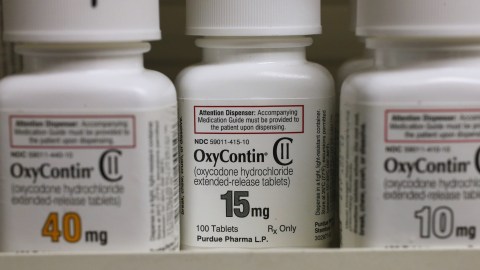In U.S. first, drug company faces criminal charges for distributing opioids

George Frey/Bloomberg via Getty Images
- The nation’s sixth-largest drug distributor is facing criminal charges related to failing to report suspicious drug orders, among other things.
- It marks the first time a drug company has faced criminal charges for distributing opioids.
- Since 1997, nearly 222,000 Americans have died from prescription opioids, partly thanks to unethical doctors who abuse the system.
A major drug distribution company and two of its former executives are facing criminal charges, marking a major shift in the battle against the opioid crisis.
The U.S. government on Tuesday charged the Rochester Drug Cooperative (RDC) with conspiring to distribute drugs, defrauding the federal government, and failing to file suspicious order reports. In addition to the company itself, indictment also named a former chief executive officer and chief of compliance in the indictment, at least one of whom was expected to surrender to Drug Enforcement Administration (DEA) agents on Tuesday.
Rochester is the nation’s sixth-largest drug distributor, and it’s the first company in U.S. history to face criminal charges for its role in the opioid epidemic. In a separate civil case, the drug company admitted that it had failed to flag suspicious opioid orders, many of which helped corrupt doctors run pill mills.
Rochester “made the deliberate decision not to investigate, monitor, and report to the DEA pharmacy customers that it knew were diverting controlled substances for illegitimate use,” according to court papers. “Because it knew that reporting these pharmacies would likely result in the DEA investigating and shutting down its customers, Rochester Drug Cooperative’s senior management directed the company’s compliance department not to report them, and instead to continue supplying those customers with dangerous controlled substances that the company knew were being dispensed and used for illicit purposes.”
Rochester has agreed to settle its civil and criminal charges, the terms of which include a $20 million fine and the expansion of its prescription monitoring system. It’s unclear exactly how the criminal charges against the two former executives will play out.
“We made mistakes,” said Jeff Eller, spokesperson for RDC, “… and RDC understands that these mistakes, directed by former management, have serious consequences.”
’Serious consequences’
Rochester is accused of distributing tens of millions of oxycodone, fentanyl, and other opioids to patients who had no legitimate medical need for them. This lack of oversight is one factor that enables the existence of pill mills, which are illicit medical operations where “patients” trade cash – or, sometimes, sexual favors – for prescription drugs.
“It’s a huge money maker. Huge,” said Jennifer Carpenter, the branch manager of the Kentuck Attorney General’s Drug Investigations Branch. “Think about it. They may have 60 people on a list to be seen each day. At about $200 a person, if they see 60 people, four days a week, that’s $48,000.”
What’s more, a 2018 study, published in the journal Annals of Internal Medicine, found that 28.5 percent of opioid prescriptions over a 10-year period failed to provide a valid medical reason for why patients needed the drugs. This easy access to drugs had undoubtedly led to more deaths. From 1999 to 2017, about 218,000 Americans died from overdoses related to prescription opioids. So, when Rochester refers to “serious consequences,” keep those numbers in mind.





